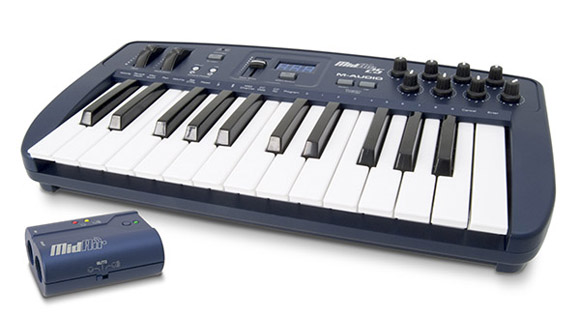We’re always looking for ways to ditch some wires in our performance rig. M-Audio just gave us a new one. They’ve unveiled a completely wireless set of products called MidAir, including 25- and 37-key keyboards and an upcoming MIDI interface you can use with any MIDI device, all with a 30-foot range and battery power. And here’s the big surprise: pricing starts at US$250 list. Thanks be to volume. Full details from M-Audio after the jump.

MidAir is powered by Frontier’s wireless technology (the folks behind our beloved TranzPort wireless remote, as seen here before). The gear uses the 2.4GHz spectrum and features a 30-foot range and low-latency. (And yes, you can have the same low latency over wireless as you would using a USB keyboard.) The products themselves should look familiar: the 25-key keyboard has the layout of M-Audio’s ubiquitous Oxygen keyboards, but with the new gray color and nicer pitch and mod wheels from the Axiom. The 37-key version will add 8 faders. Everything is programmable, as always, so the MidAir is not only useful for playing soft synths but remote control surface, as well. (And they’re very popular with the VJ set, too.)
You really can ditch all of your wires, because the MidAir is completely battery powered (9V, it looks like). The remote unit is interesting, as well; M-Audio could have just left it as a USB paperweight that connects to your computer, but they chose to give it MIDI I/O, too, making it a useful MIDI interface on its own. In fact, the only thing missing is a strap mount, which would seem an obvious choice for a wireless device but M-Audio chose to leave off. Stay tuned here, as I’m sure someone will mod this into a strap-mounted keytar within days of it shipping. We can easily out-cool M-Audio, too, gang: I want to see a polished hardwood handle with light-up LED effects and a cowhide strap.
When things will get really interesting is when M-Audio ships a MIDI interface version of this, expected in August. When that happens, any MIDI hardware you have can become wireless, so dust off that battery-powered keytar and get ready. (I’m thinking Roland AX-7, myself.)
M-Audio isn’t the first to make a wireless interface — we’ve seen them here before — but other versions have been clunky, ugly, and expensive. This looks simple, elegant, and cheap. It’s actually priced like a wired model; the premium should be really minimal at street pricing. If it lives up to its performance promises, it’ll be a huge hit. We’ll know for sure once we get a unit in for review.
MidAir 25 Product Page [M-Audio]
Compatibility: Mac, Windows, and (thanks to class-compliance) Linux
Availability: Estimated late June (25-key), July (37-key), August (standalone MIDI interface)
Pricing: US$249.95 (25-key), $299.95 (37-key), TBD (standalone interface)
Commentary elsewhere:
Tom at Music Thing was so inspired by this announcement that he posted a brilliant roundup of hot keytar action. Brilliant stuff, with insanely great keytar players.
Tom points to the Kenton wireless system. This is indeed more rugged, but at a price: the receiver is enormous, even the transmitter is rather large, and the whole thing will set you back GBP400. The payoff is the range jumps from 30 ft. as on the MidAir to a whopping 260 feet outdoors (less indoors). The MIDIjet Pro I’ve covered here can get up to a full 500 feet. It’s also much more compact than the Kenton, and costs only US$400. But I suspect for most of us, that’s still too much cost to justify . . . well, certainly, until some of us get gigs on stages that large! (Unless you’re planning on bodysurfing with your keytar, in which case, send video.) For premium wireless MIDI, options are still out there. For something you can afford and easily stick in a pocket, I can’t wait to review M-Audio’s more mass-market offering. (Incidentally, this is 2.4GHz but it’s definitely not Bluetooth, so forget any troubles you’ve heard about that route — this should be lower latency, having fooled around a bit with 2.4GHz transmitters and receivers on DIY projects.)